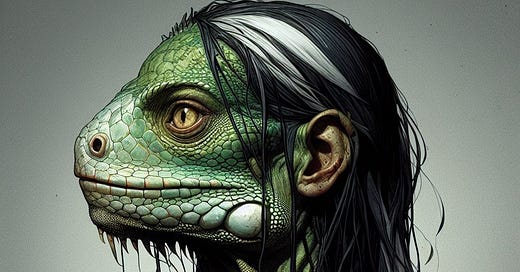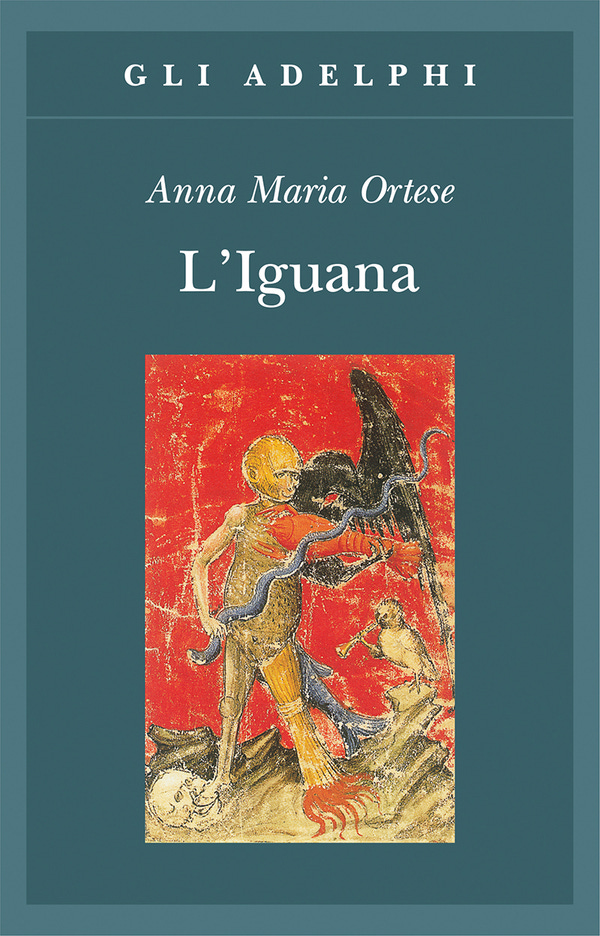Reading Anna Maria Ortese's The Iguana Through Vedantic Eyes
On illusion, reality, and sacred reptiles
Every time I return to this line from the Upanishads, I feel a shiver:
"A man who does not know the Truth imagines: 'I am alive.‘ Just as one mistakes a rope for a snake or a bejeweled stick for a precious rod."
(Brihadaranyaka Upanishad 4.4.15)
I wonder how many times I've mistaken ropes for snakes. How many times has illusion made me see dangers where there were none or made me chase mirages that seemed so precious? It's incredible how this ancient wisdom continues to illuminate our days.
Reading "L'Iguana" ["The Iguana"] by Anna Maria Ortese, I found a passage that took my breath away: "Sentì che il suo viaggiare era stato immobilità, e ora, nella immobilità, cominciava il vero viaggiare. Sentì poi che questi viaggi sono sogni, e le iguane ammonimenti. Che non ci sono iguane, ma solo travestimenti, ideati dall'uomo allo scopo di opprimere il suo simile." ["He felt that his traveling had been immobility, and now, in immobility, true traveling was beginning. He then felt that these travels are dreams, and iguanas are warnings. That there are no iguanas, but only disguises, devised by man to oppress his fellow man."]
The same truth as the Upanishads, told differently. I lost myself in the story of Daddo, this Lombard architect who arrives at Ocaña seeking lands to buy and instead finds a mystery that transforms him.
There's a dialogue that won't leave me in peace. Daddo speaks with Estrellita, this creature half-woman and half-iguana:
"Volevate... dirmi qualcosa, o senhor?"
"Sì, Estrellita. Sei mai stata sposata?"
"No, o senhor"
"E non ti piacerebbe... con un bel velo... venire in Europa?"
La creaturina lo fissa, ride silenziosamente, poi seria: "No, o senhor"
"Perché?" chiede il conte, quasi un lamento.
"Perché no."
["Would you... like to tell me something, o senhor?"
"Yes, Estrellita. Have you ever been married?"
"No, o senhor"
"And wouldn't you like... with a beautiful veil... to come to Europe?"
The little creature stares at him, laughs silently, then serious: "No, o senhor"
"Why?" asks the count, almost a lament.
"Because no."]
And then Daddo thinks:
"Io non sto bene, però. Eccomi, in piena notte, nella deserta Ocaña, avvicinarmi a un pollaio e chiedere a una tribolata iguanuccia se vorrebbe sposarsi e venire con me in Europa... Di sposi ve ne sono fin troppi, sulla terra, e di padri, per quanto ne so, nessuno. Anche in questo caso, però, l'ostacolo rimane: può, infatti, uno spirito immortale farsi intendere dalla irrazionale Natura?"
["I'm not well, though. Here I am, in the middle of the night, in deserted Ocaña, approaching a henhouse and asking a troubled little iguana if she would like to marry and come with me to Europe... Of husbands there are far too many on earth, and of fathers, as far as I know, none. Yet even in this case, the obstacle remains: can, indeed, an immortal spirit make itself understood by irrational Nature?"]
Isn't this the question we all ask ourselves when we try to look beyond appearances? When we try to see the soul behind the form, the truth beyond the veil of maya?
Ortese has created something unique. As Giovanna Caltagirone says in her novel, "gli elementi naturali incarnano sempre anche una dimensione metafisica" ["natural elements always embody a metaphysical dimension as well"]. The iguana isn't just an iguana, just as in the Vedic metaphor, and the snake isn't a snake.
This 1965 book still speaks with surprising force. About loneliness, marginalization, our distorted relationship with nature. But above all, it is about how appearances deceive us, how we build illusory walls between ourselves and others.
I think about how many times we judge, fear, and exclude based on what our deceived senses show us. Ortese's iguana, like the rope-snake of the Upanishads, invites us to look deeper, to see beyond the veil of illusion.
Note: The English translations of the Italian quotes provided in square brackets are my own arbitrary translations from the original Italian text, not from Henry Martin's official English translation of "L'Iguana," which was not available to me at the time of writing.
Feel free to leave a comment.
I have woven tales for anyone who cares to read them. My books await you on Google Books. Check also my stories on Medium.com.
Feel free to contact me.
I would be honoured if you considered subscribing to the Premium Contents of my Vedanta Substack and leaving feedback, comments, and suggestions on this page and by writing to me at cosmicdancerpodcast@gmail.com.
Visit my BuyMeACoffee page.
Thanks for reading.






